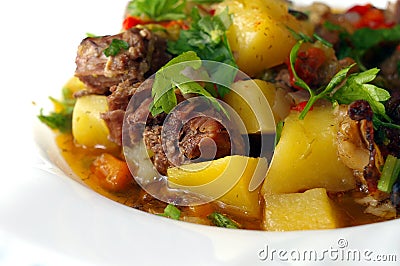What makes us eat more?

You know you should stop eating that pile of food on your plate but it’s soooo good and it’s just so hard to stop eating. How much will you eat? You may be surprised to learn some of the factors that scientists have determined play a role in the amount of food we eat.
According to a new study entitled “Mind over Platter” at the School of Experimental Psychology, University of Bristol, in the United Kingdom, and published in the International Journal of Obesity, scientists found several things affect how much food we eat, including:
 Portion size matters—the more food we pile up on our plate the more food we’ll eat. On average we eat about 92% of all the food on our plate regardless of how much food we pile on. So, if we hit the buffet and stack our food sky-high we’ll probably eat 92% of it; conversely, if we stick to a small plate of “rabbit food” we’re still likely to eat 92% of it. This is a serious concern in North America where portion sizes at many restaurants, fast food joints, and even at home have grown alongside our collective waistbands. As portion sizes grow, so will we if we keep eating 92% of everything in front of us.
Portion size matters—the more food we pile up on our plate the more food we’ll eat. On average we eat about 92% of all the food on our plate regardless of how much food we pile on. So, if we hit the buffet and stack our food sky-high we’ll probably eat 92% of it; conversely, if we stick to a small plate of “rabbit food” we’re still likely to eat 92% of it. This is a serious concern in North America where portion sizes at many restaurants, fast food joints, and even at home have grown alongside our collective waistbands. As portion sizes grow, so will we if we keep eating 92% of everything in front of us.
 When people eat from a self-refilling soup bowl, people keep on eating. Meal size grows even though people do not report feeling more “full” than when they eat less.
When people eat from a self-refilling soup bowl, people keep on eating. Meal size grows even though people do not report feeling more “full” than when they eat less.
 When people are reminded of another meal they ate, they slow down on consumption in the current meal. In other words, when someone reminds us of the big lunch we ate, we tend to eat less at dinner. There’s no big surprise there, but it makes me wonder whether the results are because of feeling guilty that we shouldn’t eat so much or if simply remembering a recent meal tends to make us feel fuller.
When people are reminded of another meal they ate, they slow down on consumption in the current meal. In other words, when someone reminds us of the big lunch we ate, we tend to eat less at dinner. There’s no big surprise there, but it makes me wonder whether the results are because of feeling guilty that we shouldn’t eat so much or if simply remembering a recent meal tends to make us feel fuller.
 We also eat less food when it is perceived as unhealthy (81% compared to 92%), possibly because the food fills us up faster but perhaps because we think we shouldn’t eat so much of something that isn’t good for us.
We also eat less food when it is perceived as unhealthy (81% compared to 92%), possibly because the food fills us up faster but perhaps because we think we shouldn’t eat so much of something that isn’t good for us.
 While most people may think they eat more while watching television, research showed we eat more when we are alone and there is nothing to distract us from our food. Undistracted and on our own we eat 97% of the food on our plate but if we eat with others or with the TV on, we eat 89% of our food.
While most people may think they eat more while watching television, research showed we eat more when we are alone and there is nothing to distract us from our food. Undistracted and on our own we eat 97% of the food on our plate but if we eat with others or with the TV on, we eat 89% of our food.
(www.care2.com)
Our Tips

Figure friends recommend: Laugh yourself slim! Did you know that your body cannot smile when your mind is nor smiling? In this article we focus on the whole body and especially the h ...

Women´s waist circumference should not exceed 88cm and men´s 102cm. It's not only the measurement of the beauty, it´s also a very important disease risk i ...

